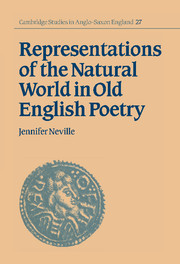Book contents
- Frontmatter
- Contents
- Acknowledgements
- List of abbreviations
- 1 Introduction: defining the natural world
- 2 Defining and confining humanity
- 3 Constructing society: outside and inside, powerlessness and control
- 4 Standing outside, standing out: defining the individual
- 5 Representing God: power in and against nature
- 6 Enclosing the natural world: knowledge and writing
- 7 Conclusion
- Bibliography
- Index
7 - Conclusion
Published online by Cambridge University Press: 29 September 2009
- Frontmatter
- Contents
- Acknowledgements
- List of abbreviations
- 1 Introduction: defining the natural world
- 2 Defining and confining humanity
- 3 Constructing society: outside and inside, powerlessness and control
- 4 Standing outside, standing out: defining the individual
- 5 Representing God: power in and against nature
- 6 Enclosing the natural world: knowledge and writing
- 7 Conclusion
- Bibliography
- Index
Summary
Representations of the natural world in Old English poetry provide insights into a number of topics about which Anglo-Saxon writers failed – either through neglect or the disappearance of manuscripts – to leave much direct commentary. They can define the place and state ascribed to humanity. They can reflect the necessity as well as the fragility of human society. They can contribute to the depiction of extraordinary and exemplary individuals. They can declare the power of God even as they provide an arena for the interrogation of its application. They can furnish a body of information to be ordered by human knowledge and controlled in writing.
For all that they can do, however, the one thing that no representation of the natural world can do is supply a simple statement that summarises the functions of representations of the natural world throughout Old English poetry. Thus the problem associated with defining wisdom literature as a genre – its apparent lack of a consistent identity and unity – parallels the problem with representations of the natural world in Old English poetry generally: although one can identify some trends and structures within which representations of the natural world function, one cannot discern a unified concept that includes them all. For example, one cannot see in the natural world that defines human society as fragile and precious a connection with the natural world that reveals God's will.
- Type
- Chapter
- Information
- Representations of the Natural World in Old English Poetry , pp. 202 - 206Publisher: Cambridge University PressPrint publication year: 1999

